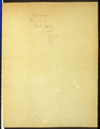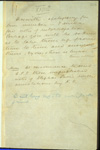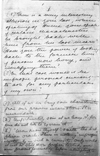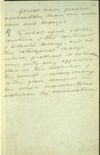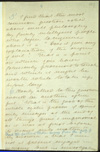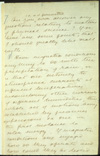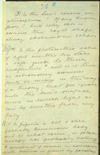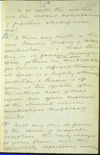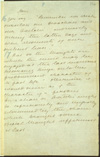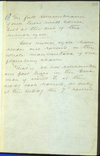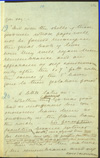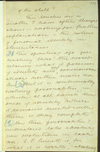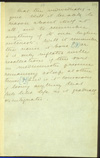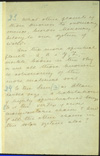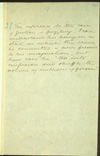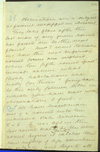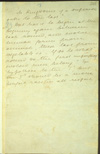Mahatma Letter No. 93a
| Quick Facts | |
|---|---|
| People involved | |
| Written by: | A. P. Sinnett/Koot Hoomi |
| Received by: | Koot Hoomi/A. P. Sinnett |
| Sent via: | unknown |
| Dates | |
| Written on: | unknown |
| Received on: | October 1882 |
| Other dates: | unknown |
| Places | |
| Sent from: | unknown |
| Received at: | Simla, India |
| Via: | unknown |
This is Letter No. 93a in The Mahatma Letters to A. P. Sinnett, 4th chronological edition. It corresponds to Letter No. 23a in Barker numbering. See below for Context and background. The answers by Master K.H. are indicated in bold.
< Prev letter chrono
Next letter chrono >
< Prev letter Barker
Next letter Barker >
Cover sheet
|
Long answers Recd Simla Oct 1882
|
|
NOTES:
|
Page 1 transcription, image, and notes
|
Herewith — apologizing for their number, I send a few notes of interrogation. Perhaps you will be so kind as to take them up from time to time and answer them by ones and twos as leisure and time allow. Memo — At convenience to send A.P.S. those unpublished notes of Eliphas Levi's with annotations by K.H. Sent long ago to our "Jacko" friend. |
NOTES:
|
Page 2
|
I. (1) There is a very interesting allusion in your last, when speaking of Hume you speak of certain characteristics he brought back with him from his last incarnation. (2) Have you the power of looking back to the former lives of persons now living, and identifying them? (3) In that case would it be improper personal curiosity — to ask for any particulars of my own? I. (1) All of us, we bring some characteristics from our previous incarnations. It is unavoidable. (2) Unfortunately, some of us have. I, for one do not like to exercise it. (3) "Man know thyself," saith the Delphian oracle. There is nothing "improper" — certainly in such a curiosity. Only would it not be still more proper to study our own present personality before attempting to |
NOTES: |
Page 3
|
learn anything of its creator, — predecessor, and fashioner, — the man that was? Well, some day I may treat you to a little story — no time now — only I promise no details; a simple sketch, and a hint or two to test your intuitional powers. |
NOTES: |
Page 4
|
II [For K.H.'s replies to these queries see post Letter 23b. — ED.] 1. Is there any way of accounting for what seems the curious rush of human progress within the last two thousand years, as compared with the relatively stagnant condition of the fourth round people up to the beginning of modern progress? 2. Or has there been at any former period during the habitation of the earth by fourth round men, civilizations as great as our own in regard to intellectual development that have utterly passed away? 3. Even the fifth race (own) of the fourth round began in Asia a million years ago. What was it about for the 998,000 years preceding the last 2,000? During that |
NOTES:
|
Page 5
|
period have greater civilizations than our own risen and decayed? 4. To what epoch did the existence of the Continent of Atlantis belong, and did the cataclysmical change which produced its extinction come into any appointed place in the evolution of the round, — corresponding to the place occupied in the whole manvantaric evolution by obscurations? |
|
NOTES:
|
Page 6
|
5. I find that the most common question asked about occult philosophy by fairly intelligent people who begin to enquire about it is "Does it give any explanation of the origin of evil?" That is a point on which you have formerly promised to touch, and which it might be worth while to take up before long. 6. Closely allied to this question would be another often put. "What is the good of the whole cyclic process if spirit only emerges at the end of all things pure and impersonal as it was at first before its descent into matter?" [And the portions taken away from the fifth?] My answer is that I am not at present engaged in excusing, but in investigating |
NOTES:
|
Page 7
|
the operations of Nature. But perhaps there may be a better answer available. |
NOTES:
|
Page 8
|
(7) Can you, i.e., is it permitted ever to answer any questions relating to matters of physical science? If so — here are some points, that I should greatly like dealt with. (8) Have magnetic conditions anything to do with the precipitation of rain, or is that due entirely to atmospheric currents at different temperatures encountering other currents of different humidities, the whole set of motions being established by pressures, expansions, etc., due in the first instance to solar energy? If magnetic conditions are engaged, how do they operate and how could they be tested? |
NOTES:
|
Page 9
|
(9) Is the sun's corona, an atmosphere? of any known gases? and why does it assume the rayed shape always observed in eclipses? 10] Is the photometric value of light emitted by stars a safe guide to their magnitude,(*) and is it true as astronomy assumes faute de mieux in the way of a theory, that per square mile the sun's surface emits as much light as can be emitted from any body? 11 Is Jupiter a hot and still partially luminous body and to what cause, as solar energy has probably nothing
|
NOTES:
|
Page 10
|
to do with the matter, are the violent disturbances of Jupiter's atmosphere due? 12 Is there any truth in the new Siemens theory of solar combustion, — i.e., that the sun in its passage through space gathers in at the poles combustible gas (which is diffused through all space in a highly attenuated condition), and throws it off again at the equator after the intense heat of that region has again dispersed the elements which combustion temporarily united? 13 Could any clue be given to the causes of magnetic variations, — the daily changes at given places, and the apparently capricious curvature |
|
NOTES:
|
Page 11
|
of the isogonic lines which show equal declinations? For example — why is there a region in Eastern Asia where the needle shows no variation from the true north, though variations are recorded all round that space? (Have your Lordships anything to do with this peculiar condition of things?) 14 Could any other planets besides those known to modern astronomy (I do not mean mere planetoids) be discovered by physical instruments if properly directed? |
NOTES: |
Page 12
|
15 When you wrote "Have you experienced monotony during that moment which you considered then and now so consider it, — as the moment of the highest bliss you have ever felt?" Did you refer to any specific moment and any specific event in my life, or were you merely referring to an X quantity — the happiest moment whatever it might have been? |
NOTES: |
Page 13
|
16 You say: — "Remember we create ourselves, our Devachan, and our Avitchi and mostly during the latter days and even moments of our sentient lives." 17 But do the thoughts on which the mind may be engaged at the last moment necessarily hinge on to the predominant character of its past life? Otherwise it would seem as if the character of a person's Devachan or Avitchi might be capriciously and unjustly determined by the chance which brought some special thought uppermost at last? |
NOTES: |
Page 14
|
18 "The full remembrance of our lives will come but at the end of the "minor cycle." Does "minor cycle" here mean one round, or the whole Manvantara of our planetary chain? That is, do we remember our past lives in the Devachan of world Z at the end of each round, or only at the end of the seventh round? |
NOTES: |
Page 15
|
19 You say "And even the shells of those good men whose pages will not be found missing in the great book of lives: — even they will regain their remembrance and an appearance of self consciousness only after the sixth and seventh principles with the essence of the fifth have gone to their gestation period." 20 A little later on: — "Whether the personal Ego was good, bad or indifferent, his consciousness leaves him as suddenly as the flame leaves the wick — his perceptive faculties become extinct for ever." (Well? can a physical brain once dead retain its perceptive faculties: that which will perceive in the shell is something that perceives with a borrowed or reflected light. See notes.) Then what is the nature of the remembrance and self-consciousness |
NOTES: |
Page 16
|
of the shell? This touches on a matter I have often thought about — wishing for further explanation — the extent of personal identity in elementaries. 21 The spiritual Ego goes circling through the worlds, retaining what it possesses of identity and self-consciousness, always neither more nor less (a) But it is continually evolving personalities, in which at all events the sense of identity while it remains united with them is very complete. (b) Now these personalities I understand to be absolutely new evolutions in each case. A. P. Sinnett is, for what it is worth, — absolutely |
NOTES: |
Page 17
|
a new invention. Now it will leave a shell behind which will survive for a time (c) assuming that the spiritual monad temporarily engaged in this incarnation will find enough decent material in the fifth to lay hold of. (d) That shell will have no consciousness directly after death, because "it requires a certain time to establish its new centre of gravity and evolve its perception proper." (e) But how much consciousness will it have when it has done this? (f) Will it still be A. P. Sinnett of which the spiritual Ego, will think, even at the last, as of a person it had known — or will it be conscious |
|
NOTES: |
Page 18
|
that the individuality is gone? Will it be able to reason about itself at all, and to remember anything of its once higher interests. Will it remember the name it bore? (g) or is it only inflated with recollections of this sort in mediumistic presence, remaining asleep at other times? (h) And is it conscious of losing anything that feels like life as it gradually disintegrates? |
NOTES: |
Page 19
|
22 What is the nature of the life that goes on in the "Planet of Death?" Is it a physical reincarnation with remembrance of past personality, or an astral existence as in Kama Loka? Is it an existence with birth, maturity and decay, or a uniform prolongation of the old personality of this earth under penal conditions? |
NOTES: |
Page 20
|
23 What other planets of those known to ordinary science, besides Mercury, belong to our system of worlds? Are the more spiritual planets — (A, B & Y, Z) — visible bodies in the sky or are all those known to astronomy of the more material sort? 24 Is the Sun [a] as Allan Kardec says: — a habitation of highly spiritualized beings? (b) Is it the vertex of our Manvantaric chain? and of all the other chains in this solar system also? |
NOTES: |
Page 21
|
25 You say: — it may happen — "that the spiritual spoil from the fifth will prove too weak to be reborn in Devachan, in which case it's sixth will then and there reclothe itself in a new body — and enter upon a new earth existence, whether upon this or any other planet." 26 This seems to want further elucidation. Are these exceptional cases in which two earth lives of the same spiritual monad may occur closer together than the thousand years indicated by some previous letters as the almost inevitable limit of such successive lives?
|
NOTES:
|
Page 22
|
27 The reference to the case of Guiteau is puzzling. I can understand his being in a state in which the crime he committed is ever present to his imagination, but how does he "toss into confusion and shuffle the destinies of millions of persons?" |
|
NOTES:
|
Page 23
|
28 Obscurations are a subject at present wrapped in obscurity. They take place after the last man of any given round has passed on to the next planet. But I want to make out how the next superior round forms are evolved. When the fifth round spiritual monads arrive what fleshly habitations are ready for them? Going back to the only former letter in which you have dealt with obscurations I find: — (a) "We have traced man out of a round into the Nirvanic state between Z and A. "A" was left in the last round dead. (See note.) As the new round begins it catches the new influx of life, reawakens to vitality, and begets all |
|
NOTES: |
Page 24
|
its kingdoms of a superior order to the last." 29 But has it to begin at the beginning again between each round, and evolve human forms from animal, these last from vegetable, etc. If so to what round do the first imperfectly evolved men belong? Ex hypothesi to the fifth; but the fifth should be a more perfect race in all respects. |
NOTES: |
Context and background
Physical description of letter
The original is in the British Library, Folio 1. According to George Linton and Virginia Hanson, the letter was written:
The first part of this letter consists of a long list of questions from APS to KH, written on note paper. Some marginal notes and underscorings have been made by KH in blue pencil and some reference numbers inserted. Part B consists of KH's answers to APS's questions, on full-sized sheets of paper, some folded, some single sheets. The first part is on a rippled white paper, and the latter part is on a smooth, bright pink paper. The KH script is in dull black ink through the answer to Q. 5, then changes to pale blue ink. There are a few marks in blue pencil. The letter gives the impression of having been written intermittently. (See top of p. 439 and top of p. 317.)[1]
Publication history
Commentary about this letter
Notes
- ↑ George E. Linton and Virginia Hanson, eds., Readers Guide to The Mahatma Letters to A. P. Sinnett (Adyar, Chennai, India: Theosophical Publishing House, 1972), 157.
